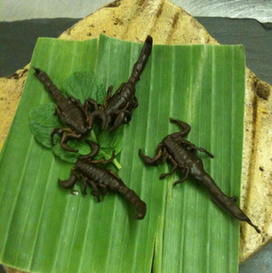全球氣候日益暖化,世界人口不斷增長,聯合國糧農組織呼吁“肉食者”改吃昆蟲,并正在考慮推廣昆蟲食品,以減少溫室氣體排放量。研究顯示,飼養牛、羊等家畜需要占用全球三分之二的農田,而且導致全球變暖的溫室氣體中有五分之一是家畜及其飼養過程中排放出來的。聯合國糧農組織的專家表示,到2050年,世界人口將從目前的60億增長到90億,隨著人口的增長,人們對肉類的需求也將增加。到時候,人類將可能面臨“肉危機”。如果人們改為食用昆蟲,這一問題將得到解決。養殖昆蟲所產生的溫室氣體遠比養殖家畜低,飼養常見的食用昆蟲(如蝗蟲、蟋蟀和膳食蠕蟲)所排放的甲烷比家畜排放的少10倍;而且昆蟲含有高蛋白、維生素和礦物質,吃起來更健康。

 |
|
The UN Food and Agriculture Organization is taking seriously the farming of creepy-crawlies as nutritious food. |
Saving the planet one plateful at a time does not mean cutting back on meat, according to new research: the trick may be to switch our diet to insects and other creepy-crawlies.
The raising of livestock such as cows, pigs and sheep occupies two-thirds of the world's farmland and generates 20% of all the greenhouse gases driving global warming. As a result, the United Nations and senior figures want to reduce the amount of meat we eat and the search is on for alternatives.
A policy paper on the eating of insects is being formally considered by the UN Food and Agriculture Organization. The FAO held a meeting on the theme in Thailand in 2008 and there are plans for a world congress in 2013.
Professor Arnold van Huis, an entomologist at Wageningen University in the Netherlands and the author of the UN paper, says eating insects has advantages.
"There is a meat crisis," he said. "The world population will grow from six billion now to nine billion by 2050 and we know people are consuming more meat. Twenty years ago the average was 20kg, it is now 50kg, and will be 80kg in 20 years. If we continue like this we will need another Earth."
Van Huis is an enthusiast for eating insects but given his role as a consultant to the FAO, he can't be dismissed as a crank. "Most of the world already eats insects," he points out. "It is only in the western world that we don't. Psychologically we have a problem with it. I don't know why, as we eat shrimps, which are very comparable."
The advantages of this diet include insects' high levels of protein, vitamin and mineral content. Van Huis's latest research, conducted with colleague Dennis Oonincx, shows that farming insects produces far less greenhouse gas than livestock. Breeding commonly eaten insects such as locusts, crickets and meal worms, emits 10 times less methane than livestock. The insects also produce 300 times less nitrous oxide, also a warming gas, and much less ammonia, a pollutant produced by pig and poultry farming.
Being cold-blooded, insects convert plant matter into protein extremely efficiently, Van Huis says. In addition, he argues, the health risks are lower. He acknowledges that in the west eating insects is a hard sell: "It is very important how you prepare them, you have to do it very nicely, to overcome the yuk factor."
More than 1,000 insects are known to be eaten by choice around the world, in 80% of nations. They are most popular in the tropics, where they grow to large sizes and are easy to harvest.
相關閱讀
(Agencies)

(中國日報網英語點津 Helen 編輯)